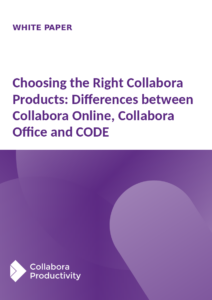Collabora, happy to be a major contributor to LibreOffice technology, is also driving development in the world of free software for online productivity solutions.
What is the situation in 2021, how can you choose what best meets your needs? Read more about CODE (Collabora Online Development Edition), Collabora Online, and LibreOffice online!
CODE - Collabora Online Development Edition

- CODE is the online version that is under constant development, so not in a stable state
- It is perfect for home use/small teams
- It is however not suitable for production environments
- Builds are released on average once a month and announced on our news pages
- CODE is built around the Collabora Office core
- Documentation on getting CODE set up, is available on the CODE page
- It is available as a docker image
- Getting involved with development is easy – and appreciated: go to collaboraonline’s github.
Collabora Online

- The production-ready and stable edition of Collabora Online
- with Long Term Support, an SLA, and signed security updates
- with access to our Customer and Partner portal; advanced technical documentation and support
- Collabora also provides tailored solutions
- Built around the Collabora Office core
- Partners and customers receive frequent updates
- Online trials in ownCloud, Nextcloud, and Seafile
- Enterprises can get Collabora Online in their favorite file share and sync software via one of our partners
- Cloud and Hosting providers can offer Collabora Online to their customers by becoming a partner
- Getting involved with development is easy on collaboraonline at github.
LibreOffice online

- LibreOffice online development was set up at the LibreOffice project by Collabora in 2014
- As a source code project, LibreOffice in the cloud aimed at growing wider contributions
- This InfoGraph shows Collabora’s contributions to the development.
- To ensure future investment Collabora moved the development to GitHub in 2020
- More on this and other reasons in the FAQ
- Update TDF’s board voted for (delayed) Atticization (policy). After the agreed deadline the ESC decided that the first criteria to keep it out of the Attic was not met.
- The source will still be mirrored at LibreOffice cgit, and Collabora continues to contribute substantially to the underlying LibreOffice technology alongside the community.
Pricing, Education & NGO's, Success stories
- EDU and NGO organizations can take advantage of special prices.
- Do read some of the testimonials from our many customers and partners.







6 Responses
Hi there,
While I understand the motivation behind the branding moves and changes, I find all this very confusing.
I am a simple user, with no coding skills, just willing to escape major companies’ greed and opacity, but trying to remain as interoperable as possible with their customers (both for obvious productivity reasons and to have some hope that they will be convinced that FOSS is better and switch). WIth this in mind, I am kind of looking for the major FOSS alternative that has some chance to challenge Microsoft Office in terms of features, stability and reproducibility of the output when opening a given file with either solution.
It was already quite some trouble some time ago for a newbie like me to navigate and try to understand the differences between StarOffice, OpenOffice, LibreOffice, KOffice and WhateverOffice. Then more recently it hasn’t got simpler when OnlyOffice came out. I think we are a bunch of people looking for the big player on which we can rely on in the FOSS world.
LibreOffice seemed to be it. For whatever good or bad reasons, that name was more and more standing out in the mainstream non-technician world. Now I find myself spending hours reading FAQs, blogs, Wikipedia articles and GitHub issues, all filled with polite language trying to tell facts without triggering less civil disputes, just because I am trying to understand what the hell is this yet other Collabora solution, where it comes from, where it stands with respect to LibreOffice, whether I should opt for it or not, whether I already use it without knowing etc.
I cannot claim that my “mere user’s perspective” should prevail, I don’t even claim it is most users’ perspective. I am conscious that, sometimes, painful moves at one point will make things better over the next couple of decades. But right now and maybe wrongly, I feel a great waste of time and energy, both at Collabora and for me to try to understand and keep up. Should you have kept the branding “LibreOffice”, with something like “LibreOffice – powered by Collabora”, or “LibreOffice – sent to the clouds by Collabora”, or whatever catch phrase making clear Collabora had done the work but keeping the “LibreOffice” main name, it would have been an instant adoption and, sort of, recognition from me. Here, seeing this new (new to me: mere user who doesn’t keep up with cutting edge developments but who just want to work) name only triggers my defiance. I just think “Oh no, I won’t go for yet another new/different stuff; let me find the LibreOffice solution.”
I think it is fair to make the name “Collabora” famous if it is true that you did the work you claim. But I think erasing the LibreOffice branding instead of keeping it and adding “Collabora” next to it will not help adoption from simple users like me, and will maintain confusion for us in the ever confusing FOSS Office software world. I just happen to be sick and I could spend time figuring out all the fuss and writing this, but in normal times, Collabora Online would have just (and unfairly) kept my attention for a couple of seconds in my overwhelming work days, just the time to think “Errr, no! Where is LibreOffice?”
Nonetheless, I wish you all the success you seem to deserve (I just think you didn’t take the easiest way to reach it in terms of branding)
I feel the same way. As a basic simple user, I’m looking for a viable alternative to Google Docs to share documents with my people and work togehter on them. I’m also spending many many hours trying to figure out what software might be appropriate and the confusing information here on the websites unfortunately only adds to the confusion as I read across FAQs and tutorials. Also, it’s hard to figure out which software is really usable for normal home users, because unfortunately you too often end up with information for businesses. A simpler guidance of the information would be useful here.
John,
I am not an expert on Collabora, but did not see any replys to your questions and statements. So I will throw my 2 cents in.
Libreoffice is a large application suite that runs on a home/workstation type computer. It is the opensource alternative to Microsoft office. It is based on Openoffice. It took the openoffice code base and ran in a different direction. Not an uncommon thing to happen with open source software. Sometimes it works out, because both Liberoffice and Openoffice are great applications. Slightly different in their goals, but it gives us end users choices.
Along comes Collabora! Collabora is an effort to move Libreoffice, a desktop application to the web/cloud. Collabora will chase Liberoffice in functionality for a few years. (They are moving a desktop application to a webserver which means they are rewriting all the code. Not a small undertaking, because if I had to guess Libreoffice probably has multiple millions of lines of code.)
The bottom line for the end user…. If you need to use an office suite from a web browser then look into Collabora. If you just need an office suite for your home computer or office workstation, then install Liberoffice or Openoffice.
Thank you for this incredibly useful comment. This does a better job than the article answering my questions
As a long-time user of Word and Excel, I was ready to move to LibreOffice when I upgraded to Apple Silicon (M1 processor). That was until I saw the comments here and on the App store. Despite the learning curve, and the confusion or conflation with Collabora, I would have no problem paying the $8.99 for Vanilla if it worked (even through Rosetta2) without major issues, and perhaps making a small additional contribution. I realize it is a work in progress and perhaps I will revisit this camel once the RISC code has been written and debugged.